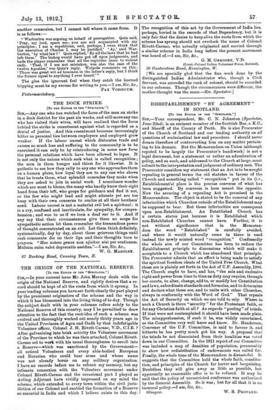THE ORIGIN OF THE NATIONAL RESERVE. [To THE EDITOR OF
THE "SPECTATOR.“] SIR,—In your current issue Mr. John Murray deals with the origin of the National Reserve, and rightly desires that a re- cord should be kept of all the roots from which it sprang. In your leading columns you have set forth clearly the part played by the prominent originators of the scheme and the way in which it has blossomed into the living thing of to-day. Though the subject dealt with in your columns refers solely to the National Reserve of this country, may I be permitted to draw attention to the fact that the root-idea of such a scheme was evolved and thoroughly worked out nearly thirty years ago in the United Provinces of Agra and Oudh by that indefatigable Volunteer officer, Colonel J. H. Rivett-Carnac, V.D., C.I.E. ? After galvanizing into brisk activity the Volunteer movement of the Province to which he was then attached, Colonel Rivett- Carnac set to work with his usual thoroughness to enroll into a Reserve—which was sanctioned by the Government— all retired Volunteers and every able-bodied European and Eurasian who could bear arms and whose name was not already borne on any military organization. I have no records before me to refresh my memory, but my intimate connexion with the Volunteer movement under Colonel Rivett-Carnac and the occasional part I played as Acting Adjutant have vividly impressed on my mind the scheme, which extended to every town within the civil juris- diction of our Colonel and enabled the formation of a Reserve so essential in India and which I believe exists to this day.
The recognition of this act by the Government of India lies, perhaps, buried in the records of that Dependency, but it is only fair that the desire to keep alive the roots from which the scheme has sprung should not overlook the name of Colonel Rivett-Carnac, who actually originated and carried through a similar scheme in India long before the present movement was heard of.—I am, Sir, &c.,
G. M. GREGORY, V.D.
(Lieut.-Colonel Indian Volunteer Force, Retired).
36 Gunterstone Road, Kensington, W.
[We are specially glad that the fine work done by the distinguished Indian Administrator who, though a Civil Servant, was accorded the rank of colonel, should be recorded in our columns. Though the circumstances were different, the mother-thought was the same.—En. Spectator.]






































 Previous page
Previous page